
Recently I have heard a mind opening speech of one of the directors of the Princeton University, Prof. Markus Brunnermeier. He spoke about the resilience in society and various fields where it can be applied. No surprise that I immediately connected it to the piano music world. Here are my thoughts:
The main idea of Prof. Brunnermeier about resilience is based on the comparison of an oak and a reed. He took over the idea from a fable of La Fontaine. In the fable the oak says to the reed: “The slightest breeze makes you bow your head, while I stand upright and firm.” The reed answered: “Do not worry about me. The winds do not harm me. I bow before them and so I do not break. You, in all your pride and strength, have so far resisted their blows.” Then a strong hurricane came and all at once the great tree fell, torn up by the roots, and lay among the pitying Reeds.
This fable allows to give some ideas about piano learning and piano event organisation:
- Piano teaching

I got my piano education from the old Russian piano school. This school has brought out many successful pianists. But it is a tough school and one can also describe it as a robust education. First goal was technical perfection of piano masterpieces, flawless performance and interpretation inspired by the well- known performers. It is more the oak type of education – robust and risk averse. It is described in the diagram by the lower dashed line, one is getting better and better, but in small steps.
This type of education gives one’s own individual preferences and creativity less importance and does not tolerate any mistakes. I went this path until I was 21 years old. Then I had as Brunnermeier calls it, a tipping point. I just could not find the motivation to go this tough way further. I stopped completely playing piano for almost 4 years. After this time I re-started with another mindset (red line) – “the reed mindset”. I started playing the music that I liked, I took more awareness of my own interpretation, and I gave up the stressful wish to play it 100 % without mistakes.
It was the resilience path according to Brunnermeier, more flexible and with more risk. It has brought back my joy for piano playing and it brought me, when I map my personal lines in the diagram, to a new level of piano playing.
In piano education there has been a big discussion which path is the best – learning a few masterpieces “close to perfection” and a solid traditional interpretation or the more experimenting type of learning with a wide variety of playing options, that tolerates mistakes and that supports individual interpretations. I do not have the statistics, but I personally know many piano students who learnt piano as kids but stopped completely when they entered the adulthood. They lost interest and motivation. The challenge is to overcome this tipping point. One solution could be to introduce a more resilient type of piano education.
2. Piano concert event management

And now to a topic that is especially close to my heart as a founder and content creator of Moving Classics new piano channel. Here in Munich we have some big concert halls and some well-established event organisations for piano concerts. They rent prestigious concert halls, book the famous pianists who return every year to play the same famous piano pieces. Without any doubt this strategy can be described as risk averse and as oak or robust type of strategy. I assume that one can find many cities that face the same type of piano event structure. The diagram shows the development. It is probably a slightly decreasing curve. The majority of the concert visitors is elderly, and the following generations are less piano interested, the reason why the curve is decreasing over the time. The big question is what happens when we have a tipping point like, for example, the Corona crisis? Could it be that some locations will be just no more profitable to rent because of the missing audience – the older generation gets older after the break and probably more careful to visit public events. Could it be that the robust strategy to offer traditional programs with the same stars of most of the piano event organisers is not an adequate answer to our new times?
The alternative reed and resilient type of strategy would be to rent smaller concert halls, offer more diverse programs, introduce new artists and last but not least to atomize the existing concert concepts and to go for new approaches.
This could be a much more resilient path because it attracts all generations and a greater diversity of music lovers and allows more flexibility. Now the best example for this successful approach is a start-up Fever Up that offers piano events in middle-size concert halls in the leading cities worldwide, with a perfect worked out lighting concept, a diverse program and new aspiring artists. And the backbone of all is an excellent AI based planning, booking, and marketing system. A very successful approach.
Times are changing very fast. The robust systems of most of the current piano event organisers might be not flexible enough. I feel that after the corona break it is probably not the best to continue with the old robust path. It is better to change to a more diverse and more flexible resilient path.
The decision between robust and resilient strategies can be also applied on a higher level: It is always a question if art is a mirror of the society or if art is a trigger and frontrunner of new trends in society. A society that is going the robust path and is focusing on incremental changes and risk minimalization can face the danger that not only the level of cultural performance but also the total level of living is going down slowly and will face a tipping point if there are serious upheavals. A society instead, that is open to new ideas, curious, flexible and courageous to take risks is much more resilient and can react in a fast and flexible way to new developments and shocks.
And which strategy is Moving Classics following, which is my own answer to this changing times? Our goal is to introduce contemporary composers to the worldwide Internet community and explore new trends in modern piano music. Among more than 450 composers that I have interviewed and whose music I have already recorded there are some who are trendsetters and others whose music is a mirror of the society. This makes me wander between the resilient and robust paths of modern piano music. An exciting journey – to have the freedom being oak or reed depending on the situation or to slide in quiet waters and to surf on the rough new waves.
When it comes to concerts, Moving Classics tries to go new ways. Soon we will start the “Sunset Hour” concert series. It is a new concept in medium size concert halls with modern piano music. A concept that follows the resilient strategy path – risky if it will be accepted but anticipating new trends. Perhaps it can be one part in a big puzzle of new developments.
Piano music is art. In the eyes of many people regardless of genre, grand piano equals to classical music and classical music for them is the oak robust type of path. But piano music stands also for innovation, discovering the unknown, exploring instead of exploiting. It is time to make the resilient path more visible.